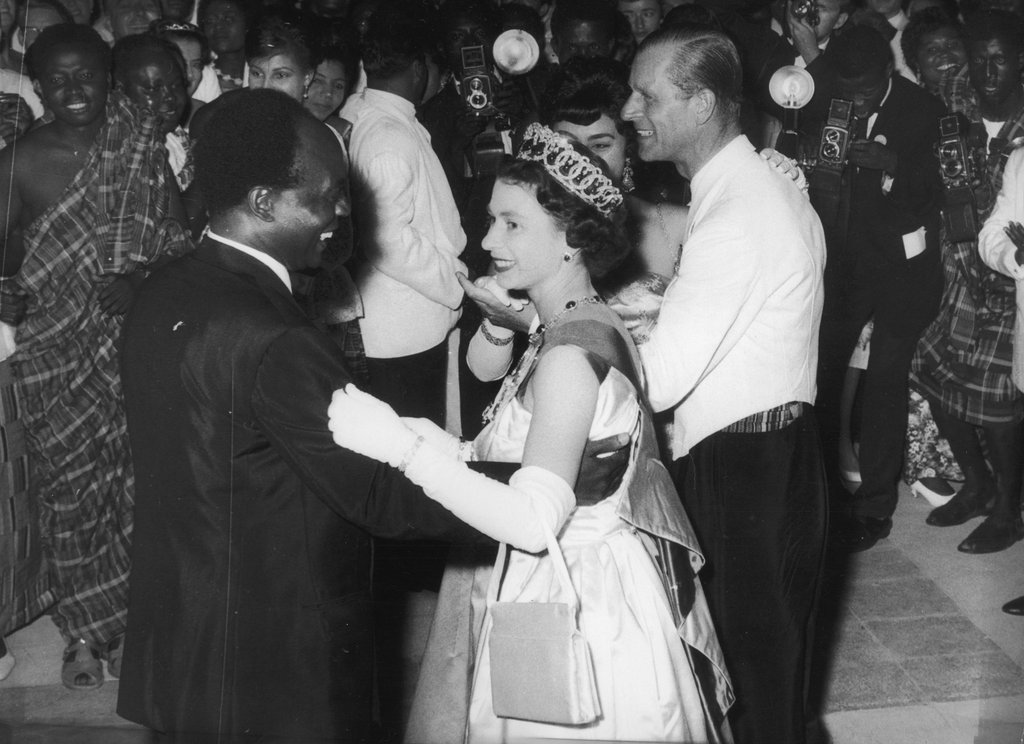“I am not a film star,” said the Queen of England to Prime Minister Harold Macmillan. “I am the head of the Commonwealth and I am paid to face any risks that may be involved. Nor do I say this lightly. Do not forget that I have three children.” Thus Queen Elizabeth II agreed with Macmillan the previous week when he conveyed to her his Cabinet’s advice that she should carry out her royal visit to Ghana, despite a spate of bombing incidents in Accra protesting the rule of Kwame Nkrumah.
Undoubtedly the world’s most powerful woman at the time, the young Queen Elizabeth took a trip to Ghana in 1961; four years after the sub-Saharan nation had gained independence from her country. This visit witnessed parades and festivals in her honor with kings, queen-mothers, princes and a host of other nobles present to pay homage to the ruler of the commonwealth.
The visit was preceded by lengthy deliberations regarding risks because of a bombing campaign in Ghana by opposition operatives. Prime Minister Harold Macmillan's statement on November 8, was as follows: “… I thought it right that the Commonwealth Secretary should pay a second visit to Ghana. This has been done. He returned to this country this morning. My colleagues and I have had from him a full appreciation of the position based on his personal inquiries on the spot. “Of course, no Royal tour is without risk. Her Majesty knows this as well as any Member of the House. But she has never been deterred in undertaking previous tours because of the personal risk to herself which is inevitable, especially when great crowds are assembled. Happily, she has come triumphantly through these trials with the enhanced affection and admiration of all. “After considering carefully and anxiously all the information before us, collected and assessed by those best qualified to do so, the Government have reached the conclusion that the degree of risk attaching to this tour is no greater than those which have been present in many of Her Majesty's previous journeys. “There are those who will ask how this conclusion can be reconciled with the explosions which have taken place in Accra during the last few days. That was one of the questions which was in the forefront of my mind when I decided it would be right for the Commonwealth Secretary to visit Ghana again. “He has given us his first-hand assessment of the significance of these incidents. While he was in Accra he took the opportunity to tour the Royal route in company with President Nkrumah, and he saw for himself the unmistakable friendliness of the crowd. “We have also had the expert advice, based on a thorough investigation on the spot, of those in this country best qualified to do this sort of work. We have had the ready co-operation of the Ghanaian authorities. “I can assure the House that, on the information and advice available to them, the Government have formed the view that the explosions did not indicate any intention by those concerned to perpetrate acts of violence during the Queen's visit which would endanger Her Majesty's safety. We have, therefore, no reason to fear that this journey will involve any additional risk to Her Majesty's safety. “On the other hand, the cancellation of this visit, so long promised and awaited by the people of Ghana, would impair the invaluable contribution made by Her Majesty's Journeys to the strengthening of the ties which bind together the peoples of the Commonwealth. The Government have therefore advised the Queen that she should proceed with her visit to Ghana. “We of course at once informed the other Commonwealth countries, with whom we have been in touch throughout. May 1, therefore, on behalf of the whole House, send Her Majesty our warmest good wishes for the success of her West African tour and a safe Return" Replying to Mr. Turton (C.), Mr. Macmillan said that the Government had been in touch with all the Commonwealth Prime Ministers and had sent them personal messages; he thought he could say that no Commonwealth Government had expressed a contrary view. Mr. Gaitskell and other Members joined with the Prime Minister in wishing the Queen a “very happy and successful tour.” The Queen and the Duke of Edinburgh accordingly left London Airport in the morning of Nov. 9 on their 3,600-mile non-stop flight to Accra.
